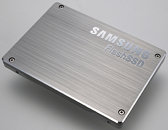- Joined
- Oct 9, 2007
- Messages
- 47,407 (7.52/day)
- Location
- Hyderabad, India
| System Name | RBMK-1000 |
|---|---|
| Processor | AMD Ryzen 7 5700G |
| Motherboard | ASUS ROG Strix B450-E Gaming |
| Cooling | DeepCool Gammax L240 V2 |
| Memory | 2x 8GB G.Skill Sniper X |
| Video Card(s) | Palit GeForce RTX 2080 SUPER GameRock |
| Storage | Western Digital Black NVMe 512GB |
| Display(s) | BenQ 1440p 60 Hz 27-inch |
| Case | Corsair Carbide 100R |
| Audio Device(s) | ASUS SupremeFX S1220A |
| Power Supply | Cooler Master MWE Gold 650W |
| Mouse | ASUS ROG Strix Impact |
| Keyboard | Gamdias Hermes E2 |
| Software | Windows 11 Pro |
Samsung Electronics Co., Ltd, a global leader in advanced semiconductor technology solutions, announced today that it has developed and started sampling 100, 200 and 400 gigabyte (GB) multi-level-cell (MLC) solid state drives (SSDs) for use as the primary storage in enterprise storage systems.
"As more and more server makers are adopting SSDs for use in eco-friendly platforms that consume less electrical power, the need for high-density SSDs in the server market is growing rapidly," said Byungse So, senior vice president, memory product planning & application engineering team, Samsung Electronics. "While Samsung is already well situated in the SSD market for enterprise servers with high-performance SSDs using single-level-cell (SLC) NAND flash memory, we are now expanding our line-up to include high-density SSDs using MLC NAND flash memory."

By employing 30-nanometer-class* MLC NAND flash chips with a Toggle DDR interface and a controller that uses a 3Gb/s (gigabits per second) SATA interface, the performance of Samsung's new MLC-based SSDs closely approaches or even exceeds some of the SLC NAND-based SSDs now in the marketplace.
The new drives can process random read commands at 43,000 input/outputs per second (IOPS) and random writes at 11,000 IOPS. This compares to a 15K RPM HDD which has an IOPS rate of 350, amounting to a 120X gain in random IOPS read performance and a 30X gain in random IOPS write performance.
In terms of power consumption, the new enterprise SSDs have a 150 times higher IOPS/Watt rate compared to 15K RPM HDDs, making them able to process 150 times more data while consuming the same amount of energy.
In addition, the new Samsung SSD features an 'end-to-end data protection' function with advanced data encryption algorithm to assure reliability and security for the drive.
With the new SSDs, Samsung widens its range of SSD densities for server and storage applications to include 2.5 inch 50, 60, 100 and 120GB SSDs using SLC NAND flash memory, and 2.5 inch 100, 200 and 400GB SSDs using MLC NAND flash memory. Samsung also now has 3.5 inch SLC-based SSDs in 100 and 200GB densities.
Starting next month, Samsung will begin mass producing its new MLC-based enterprise drives.
According to Gartner Inc., shipments of SSDs for servers and enterprise storage systems will increase to 6.3 million units in 2014 from 324K units in 2009. In revenue, the SSD enterprise market is expected to grow more than seven times from US$485 million to US$3.6 billion during the same period.
View at TechPowerUp Main Site
"As more and more server makers are adopting SSDs for use in eco-friendly platforms that consume less electrical power, the need for high-density SSDs in the server market is growing rapidly," said Byungse So, senior vice president, memory product planning & application engineering team, Samsung Electronics. "While Samsung is already well situated in the SSD market for enterprise servers with high-performance SSDs using single-level-cell (SLC) NAND flash memory, we are now expanding our line-up to include high-density SSDs using MLC NAND flash memory."

By employing 30-nanometer-class* MLC NAND flash chips with a Toggle DDR interface and a controller that uses a 3Gb/s (gigabits per second) SATA interface, the performance of Samsung's new MLC-based SSDs closely approaches or even exceeds some of the SLC NAND-based SSDs now in the marketplace.
The new drives can process random read commands at 43,000 input/outputs per second (IOPS) and random writes at 11,000 IOPS. This compares to a 15K RPM HDD which has an IOPS rate of 350, amounting to a 120X gain in random IOPS read performance and a 30X gain in random IOPS write performance.
In terms of power consumption, the new enterprise SSDs have a 150 times higher IOPS/Watt rate compared to 15K RPM HDDs, making them able to process 150 times more data while consuming the same amount of energy.
In addition, the new Samsung SSD features an 'end-to-end data protection' function with advanced data encryption algorithm to assure reliability and security for the drive.
With the new SSDs, Samsung widens its range of SSD densities for server and storage applications to include 2.5 inch 50, 60, 100 and 120GB SSDs using SLC NAND flash memory, and 2.5 inch 100, 200 and 400GB SSDs using MLC NAND flash memory. Samsung also now has 3.5 inch SLC-based SSDs in 100 and 200GB densities.
Starting next month, Samsung will begin mass producing its new MLC-based enterprise drives.
According to Gartner Inc., shipments of SSDs for servers and enterprise storage systems will increase to 6.3 million units in 2014 from 324K units in 2009. In revenue, the SSD enterprise market is expected to grow more than seven times from US$485 million to US$3.6 billion during the same period.
View at TechPowerUp Main Site
